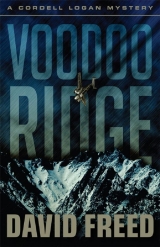
Текст книги "Voodoo Ridge"
Автор книги: David Freed
Жанр:
Триллеры
сообщить о нарушении
Текущая страница: 5 (всего у книги 17 страниц)
SIX
My phone rang at 0512 the next morning. I was dreaming I was in bed with Savannah. She was curled in the crook of my arm. I could smell the sweet, musky fragrance of her perfume. Her breath warmed my neck. Only it wasn’t a dream.
“Logan,” I said, still groggy enough that it was a challenge merely remembering my name.
“Matt Streeter, El Dorado County Sheriff’s Department. Hope I didn’t wake you up.”
“No, I’m always up this early. The milkman and me.”
“Wondered if I could buy you breakfast.”
“I’m staying in a B&B, Detective. The second “B” typically implies breakfast is included with the bed.”
“OK, coffee, then. It’s important, Mr. Logan. I wouldn’t have called this early if it wasn’t.”
Gone was his recalcitrance from the day before. There was something almost needy in his tone. I asked him where he wanted to meet. He gave me the name of a café and the address. He said it was less than five minutes from where I was staying. I said I’d be there.
Savannah cracked an eye. “What time is it?”
“Time for you to go back to sleep.”
I kissed her, said I’d be back as soon as I could, and eased out of bed.
* * *
Streeter and I rendezvoused on Emerald Bay Road, south of town, at a log cabin with a big wooden sign out front that said, “Steve’s Coffee Shop.” Virtually everything inside – tables, ceiling, walls – was made from, or covered with, tongue-and-groove planks of knotty pine. Yogi Bear would’ve felt right at home.
The waitress was a grizzled blue hair easily as ancient as my landlady, Mrs. Schmulowitz. She called Streeter, “Matty,” in a raspy voice that bespoke a lifetime of inhaling cigarette smoke. He ordered coffee, biscuits and gravy, with bacon on the side, extra crispy. Then she turned to me with pad and pen poised.
“And for you, sweet cheeks?”
“I’m good with coffee, thanks.”
“You got it, Pontiac.”
Streeter watched her shuffle off toward the kitchen.
“That’s Ruby,” he said. “She used to own the place. Sold it to her stepson a couple of years back. He can be kind of a jerk sometimes, but he cooks the best flapjacks this side of Reno.”
I pressed my fingers to my eyes and rubbed, still trying to wake up.
“Deputy Woo tells me you came up to Tahoe to get married. Congratulations. You must be very excited.”
“You didn’t roust my butt out of bed at zero dark to congratulate me on getting married, Deputy. So why don’t you just spill it.”
“You get right to the point, don’t you?”
“One of my many character flaws.”
* * *
Except for two truckers wolfing down sausage and scrambled eggs at the counter, we were the only customers in the place. But that didn’t stop Streeter from glancing nervously over my shoulder, then his, then leaning in closer, to make sure nobody could hear him.
“There’s something real weird going on with that airplane up there,” he said.
“Aside from the mummy in the pilot’s seat and the dead kid, you mean?”
Streeter nodded. He started to say something, then hesitated. “I don’t know if I should tell you this.”
“If you didn’t want to tell me whatever it is you ‘shouldn’t tell me,’ Deputy, we wouldn’t be sitting here.”
He inhaled and let his breath out slowly. The old waitress brought over two coffees in heavy white ceramic mugs.
“Cream’s on the table if you need it, honey.”
Streeter gave her a small smile and waited for her to move off.
“It’s about that airplane,” he said. “What kind did you say it was again?”
“A Twin Beech.”
“A Twin Beech, right.” He ran a palm over his mouth. “I have reason to believe the government’s hiding information on it.”
“What makes you think that?”
“You know that plywood from the crate, the piece that was outside the plane?”
I nodded.
“After you left, I turned it over.” He fished a smartphone out of his jacket pocket, tapped the screen a few times, then handed it to me. “That was on the side that was lying in the snow.”
There was a photo on the phone’s screen, a close-up showing a stencil that had been burned black into the plywood. It read:
SSFL
Property of US Government
Extreme Caution When Handling
“I did some digging,” Streeter said, spooning sugar into his coffee. “SSFL stands for Santa Susana Field Laboratory. It was a federal research facility. They operated in the hills outside Los Angeles, way back in the 1950s. Classified top secret.”
“They designed rocket fuel.”
He looked at me. “You’ve heard of it, then?”
I shrugged.
“Figured you might’ve, considering your background.”
“My background?”
Streeter clearly hadn’t restricted his digging to the Santa Susana lab.
“You were tied up in a homicide investigation a year or so ago, back in Los Angeles County,” he said. “I saw a newspaper story online. It said you and the victim used to work together in the intelligence community. Some big hush-hush assignment. It said you threatened to punch out a reporter who came snooping around, wanting confirmation. That true?”
I sipped my coffee and said nothing.
Streeter half smiled. “That’s what I thought.”
He told me that his forensic investigators could find no wallet on the pilot who’d died at the controls of the Twin Beech. Without an airman’s certificate or driver’s license, there was nothing readily available to identify him. Moreover, the serial number on the .45-caliber pistol stashed in the dead man’s coat pocket had been filed off, rendering the gun all but untraceable.
“But that’s not the weirdest part,” Streeter said.
“And that would be…?”
“The Federal Aviation Administration has a web site.”
“That is pretty weird, considering how Neanderthal the FAA is.”
“That’s not what I meant.”
I let him finish.
“The FAA maintains a registry of every plane ever built in the United States. I inputted the tail number to see who owned it and find out when it was reported missing. All I got back was, ‘File access restricted.’ ”
Streeter said he promptly called the FAA’s twenty-four hour operations center in Washington, identified himself as a sworn member of law enforcement, and explained that he was actively investigating a homicide. Whoever he spoke to, he said, told him he’d have to write a formal letter of request for any information and send it by registered mail. The request would be reviewed by staff counsel. He could expect a response in six to eight weeks.
“I told her that was unacceptable. She couldn’t have cared less.”
“Consider yourself lucky. For the FAA to respond to anything in six to eight weeks, we’re talking world-record pace.”
“You’re a pilot,” Streeter said. “You tell me: why would they restrict any information on a plane that’s been missing that long, let alone an entire file? It’s like they’re hiding something.”
I shrugged. “Your guess is as good as mine.”
Ruby brought over a white china plate with five thick strips of hickory-cured bacon and set it down in front of Streeter.
“Matty always likes to eat his bacon first, before anything else,” she explained to me. “He’s an eccentric, this one.”
“I just don’t like getting maple syrup on my bacon, that’s all,” Streeter said.
She gave him an affectionate peck on the top of his head and shuffled outside for a quick smoke, lighting up a Virginia Slims before she was even out the door. Cold air rushed in.
“What about Chad?”
Streeter looked at me like he didn’t understand.
“Your victim. The dead kid. From the airport.”
“What about him?”
“What was he doing up there?”
Streeter chewed a strip of bacon. “Best guess? You landed, told Chad you’d seen a downed airplane. He calls my department. Deputy Woo buys the call. Woo shows up, you tell him what you saw, correct?”
“Affirmative.”
“Chad’s standing there. He’s listening in. He’s local, knows the area like the back of his hand. He gets off work, tells a buddy, and they decide, ‘Hey, we’ll just hike in there and steal whatever we can from the wreckage before search and rescue can get in.’ Happens all the time, people looting downed airplanes. So they get up there. They pry open the crate. Something inside that’s worth big money. Only Chad’s buddy decides he’s not interested in profit sharing. So, like you said yesterday, Chad gets capped and his buddy makes off with the merchandise.”
“Sounds like you got it dialed in.”
“It’s a workable premise. Let’s put it that way.”
“Why did you want to see me this morning?”
Streeter wiped his mouth with his napkin and picked a bacon bit from the gap between his front teeth. “I need to know why the FAA put a clamp on that file.”
“I’m not on real intimate terms with the FAA these days, Deputy. Let’s just say we’ve had our differences.”
“But you did work in the intelligence community. You have a security clearance, correct?”
“Hypothetically, if I ever did hold a clearance, it would’ve been revoked when I turned in my resignation papers. That’s assuming I ever worked for the government, which I’m not saying I did or didn’t.”
The deputy’s biscuits and gravy arrived, smelling like I imagine heaven smells – the yeasty musk finished off with an irresistible hint of lard. I could feel my arteries congealing just inhaling.
“Enjoy,” Ruby said, reeking of tobacco.
Again, Streeter waited until she was out of audio range.
“OK, fine, so you don’t have an active clearance. But, assuming you did work for the government, like the newspaper said, you’d still have contacts, friends who could do you a favor, correct?”
“That’s a whole lot of assuming, Deputy.”
Two young men with brown skin and stylishly coiffed black hair walked in and hovered near the door, waiting to be seated. Busy chowing down, Streeter didn’t notice them. I did. Some may have mistaken the two for Arabs. I knew them to be Iranians who, I observed in my adventures abroad, are inclined to be taller and slightly lighter in complexion than their Middle Eastern neighbors. Iranian men also tend to be more fashionably attired and more attentive to personal grooming. These guys were all that. Pricey jeans and black leather jackets. No shortage of cologne. Not a nose hair in sight.
The taller of the two caught me looking and tried staring me down. I held my gaze. Dominant males, I learned with Alpha, reflexively maintain eye contact when confronted with what they perceive instinctively as other, socially aggressive males. It goes back to the time when we all swung from the trees by our tails: to see its prey, the hunter must always expose its eyes. When the hunted breaks eye contact, it’s a sign of submission that signals, in essence, “Do with me what you will; I won’t fight back.”
After a few seconds, the taller Iranian looked away, leaned closer to his companion and muttered something in his ear. Pretending to peruse the plastic laminated menu, his friend, a powerfully built fireplug, turned and glared at me. I glared back.
Streeter turned and looked over his shoulder, chewing on a strip of bacon, curious to see what I was seeing. The taller Iranian noticed him and nodded in a not friendly way. Streeter nodded in response and turned back toward me.
“The tall guy’s name is Reza Jalali,” he said. “Owns a couple convenience stores in town. The other guy, I’ve never seen before.”
“Something hinky about that dude,” I said.
“Clearly, you don’t trust your fellow man, Mr. Logan.”
“I used to. Then I read Lawrence Ferlinghetti, who said that if you’re too open-minded, your brains fall out.”
Streeter smiled. I watched him dip a piece of bacon in the gravy, stuff the bacon in his mouth, and lick grease from his fingers. Back at the Tranquility House Bed-and-Breakfast, the Kavitches, Johnny and Gwen, would probably be serving up organic granola with reduced-fat yogurt and fresh fruit because that’s what B&B owners do – try to convince you that there’s something inherently healthier staying with them than at the Comfort Inn, where you cook your own waffles with premixed cups of “batter” that looks a lot like baby spit-up.
Streeter salted and peppered his biscuits and gravy. “So, what do you say? You think you could put a call in for me?”
I told him I’d think about it.
“Either way,” I said, “it’ll cost you a strip of bacon.”
“Knock yourself out.”
He slid his plate across the table.
Elevated triglycerides never tasted so good.
* * *
Snow was coming down as I walked out of the restaurant. Big soft fluffy flakes that fell slowly through the pines, muffling all sound and washing all color from the morning. I used my arm to brush off the driver’s door on the Yukon, got in, started the engine and fired up the heater.
I figured there’d be little harm, making a call or two on Deputy Streeter’s behalf. I’ll admit, part of my motivation in helping him out was ego driven. I’d seen and done a thousand things in defense of my country. I’d been trained to compartmentalize those things, to keep secret from any and all but my fellow go-to guys the tactics, techniques, and procedures we exercised to do those things. But Streeter had been correct: I did know people in government who enjoyed access to restricted information, including Paul Horvath, an investigator with the FAA’s Flight Standards District Office in San Diego.
Horvath had been assigned to determine the cause of my near-fatal accident a few months earlier at San Diego’s Montgomery Airport. He’d concluded that an intentional act of sabotage had forced me to crash land the Ruptured Duck, and that the incident had been in no way my fault. That, however, hadn’t stopped the FAA from tormenting me for months afterward, what with the dozens of reports and sworn declarations I was compelled to submit just to keep my flight school certified and my pilot’s certificate intact.
I found Horvath’s card in my wallet and called him.
“Who?” Horvath said, yawning, half asleep.
“Cordell Logan.”
I’d forgotten it wasn’t yet 0700. It took him a few seconds to remember me.
“What time is it?”
I told him. Then I told him why I was calling.
“Let me make sure I have this correctly. You want me to give you confidential information from a restricted agency file?”
“Yes.”
“Without going through proper channels? Is that what you just asked me?”
“Proper channels could take weeks, Mr. Horvath. The information is needed in an ongoing police investigation, the murder of a young man in the mountains outside Lake Tahoe.”
“Mr. Logan, I’m as law and order as they come. I hope they find the killer and put him away. But what you’re asking me to do is to commit a crime, a very serious crime, not to mention jeopardize my career. I’m sorry. I can’t help you.”
I apologized for having called so early and signed off. Not without some reluctance, I then called my buddy, Buzz.
“This is not directory information, Logan,” Buzz grumbled over the phone. “Don’t you have any other friends who still work for Uncle Sugar? I’m busy. I have things to do, like saving the free world. Why are you always calling me?”
“Because we share a history, Buzz. Because I love you like the deranged, antisocial brother I never had.”
“Well, when you put it that way…”
Buzz (not his real name) was an opera-loving, former Delta operator who’d been among Alpha’s initial cadre of go-to guys – a “plank holder,” as they were known. He’d lost an eye to RPG shrapnel on one especially gnarly op outside Benghazi. After the White House shut down Alpha as a potential political liability, he’d ended up working at the Defense Intelligence Agency, riding an analyst’s desk that kept him inside most days, an assignment he’d used to good effect. Buzz cultivated more intra-agency connections over the years and possessed more behind-the-scenes insights about the inner workings of the alphabet agencies than probably any member of the intelligence community who ever lived.
I told him how I’d happened to stumble upon the wreckage of the long-missing airplane, about the murdered kid, the crate from the Santa Susana Field Lab, and the FAA’s unwillingness to cooperate with a homicide investigation. Buzz asked me for the plane’s tail number. I gave it to him. He said he’d ask around and see what he could come up with. I didn’t even have to bribe him, which I usually did.
“You seem like you’re in an unusually agreeable mood, Buzz.”
“Got busy with the wife last night. First time in a month. I put on a little Pavarotti, she squeezed into something skimpy I got her for Valentine’s Day five years ago, which was the last time I remembered Valentine’s Day, and we rocked the house. The kitchen. Our bed. The dog’s bed. It was something, lemme tell ya.”
“I could’ve definitely gone all day without knowing about the dog’s bed, Buzz.”
“Hey, you asked.”
“So I did. Live and learn.”
“What are you doing in Tahoe, Logan? Tahoe’s for rich people. The beautiful people. Beautiful is not a word that comes readily to mind when I think of your sorry mug.”
“Savannah and I are getting remarried.”
There was a long silence on the other end.
“Say again?”
“We’re getting remarried.”
“To Savannah?”
“Affirmative.”
“The Savannah who dumped you for Arlo Echevarria?”
“One and the same.”
There was a time when Buzz wouldn’t have hesitated to tell me that I’d lost my mind, reconciling with a woman who’d left me for a brother warrior. But for once, he held his tongue.
“I just hope you know what you’re doing, Logan.”
“Makes two of us, buddy.”
He said he’d get back to me with whatever relevant insights he could find on the crashed Beechcraft. I told him I’d be waiting.
The snow was coming down heavier, beginning to blanket the cars in the lot. I envisioned a leisurely breakfast back at Tranquility House with Savannah, followed by a romantic interlude in the privacy of our bungalow with a cozy fire in the fireplace. We’d drive into town after that, take out a marriage license, and exchange vows.
I couldn’t have known that by the time I got back, she’d have gone without so much as a word of good-bye.
SEVEN
Nothing seemed amiss.
The damp washcloth draped over the faucet and the water beaded on the tiled walls of the shower stall told me that Savannah had showered shortly after I’d left our bungalow to meet with Deputy Streeter.
There were two bras and two pairs of panties in the plastic bag she used for dirty laundry. That told me she’d apparently dressed for the day and left – but without her long down coat, which was still hanging in the closet. I knew she wouldn’t have gone for a walk without it, given the weather.
I also knew she hadn’t gone for a run. Her Nikes were still packed in her suitcase, and her iPhone in its pink protective case was still on the nightstand, charging. Savannah never went anywhere without her phone.
I ventured back outside, searching for tracks in the freshly fallen snow, but the only ones I could see were mine. That told me she’d gone before the snow started falling.
“Haven’t seen her all morning,” Johnny Kavitch said when I went into the main house. “She didn’t come in for breakfast. It’s still sitting on the table in the dining room, untouched. Yours, too. Gwen, have you seen Savannah this morning?”
Kavitch’s wife emerged from the kitchen, wiping her hands on a red and white striped dish towel. “Listening to the TV. I’m sorry, were you calling me?”
“Have you seen Savannah this morning?” I asked before Johnny could.
Gwen frowned and stared at the floor for a second, trying to remember. “Come to think of it,” she said, “I can’t say that I have. I’m sure she’s around here somewhere, though. Unless she took your car and decided to go into town.”
“I had the car. What about your son? Where is he?”
“Preston?” Gwen traded a troubling glance with her husband. “Still sleeping. We let him sleep in. His counselor says it’s good therapy.”
The acrid taste of bile rose up in the back of my throat.
“Where’s his bedroom?”
“Upstairs. Why?”
I bounded up the stairs, taking them three at a time.
“That’s our private residence,” Johnny hollered after me. “You can’t go up there! Hey!”
I ignored him.
Preston’s bedroom was down a short hallway decorated with framed family photos, the last door on the left. It was the only one that was locked. I booted it open, splintering the jam, and went in. He bolted upright, shirtless, startled awake. The posters covering his walls were a testament to the blood-fest video games he was apparently into—Resident Evil and Mortal Kombat.
“Get out of my room!”
“Where is she, Preston?”
“Where’s who? I don’t know what you’re talking about!”
I moved toward him.
“Yes, you do.”
“I don’t know where your wife is, man!” He pulled the covers up around his pale, concentration camp survivor chest and cowered against the headboard, trying to get as far from me as he could. “How would I know where she is? I told you. Get out!”
“I’m gonna ask you one more time, Preston, then I’m gonna take you apart, one piece at a time. Now, where… is… she?”
“I told you! I don’t know where she’s at! Dad! DAD!”
“This is definitely not cool!” Johnny said, bounding in with his wife hard on his heels. He was clutching a ski pole like a spear.
“You need to take a deep breath and calm down, Mr. Logan,” Gwen said with her palms outstretched, pleading. “Please. Before someone gets hurt.”
“My wife is missing and I’m wondering if Cujo here knows something he isn’t telling.”
“You have no right to call my son names,” Gwen said.
“Mom, I told him. I don’t know nothing what he’s talking about!”
I might’ve corrected him on his use of double negatives, but intuition told me that was the least of Preston Kavitch’s sins.
* * *
Streeter answered his phone on the second ring. I told him that Savannah had disappeared, and that I was worried.
“How long has she been gone?”
“I don’t know. I came back from meeting with you, and she wasn’t here.”
“We don’t usually take missing persons reports until the party’s been gone at least twenty-four hours,” Streeter said.
“Every hour a kidnapping victim remains missing, the chance of recovering that victim alive declines ten percent.”
“How do you know that?”
“It doesn’t matter how I know. I’m asking you to help find her.”
“Does she jog?” Streeter asked.
“Occasionally.”
“OK, so it could be she went jogging. Maybe she stopped for coffee somewhere.”
I told him how her running shoes were still packed away in her suitcase.
“There’s something else you should know,” I said. “She’s pregnant.”
“How far along is she?”
“Couple months.”
Streeter speculated that Savannah may have had a complication with her pregnancy. He said he’d put in a call to the local hospital.
“If there was a medical problem,” I said, “she wouldn’t have just started walking, and definitely not without her coat. She would’ve asked the people we’re staying with for a ride to the hospital. She didn’t do that.”
“Well, there’s probably some logical explanation,” Streeter said. “She’ll be back. You just need to be patient.”
Patience, unfortunately, has never been my strong suit.
“I have a proposition,” I said.
“A proposition?”
“You get a fingerprint tech over here in the next hour and I’ll get you the information you want from that FAA file.”
“If I didn’t know better, Mr. Logan, I’d say you’re trying to coerce a sworn peace officer.”
“I prefer to call it a quid pro quo.”
Streeter drew out a long, slow breath over the phone. “I can’t promise an hour,” he said, “but I’ll see what I can do.”
I hung up and stood at the window, gazing out at the white-flocked Currier and Ives landscape. Streeter had asked me how I knew about kidnapping survival statistics. I wasn’t about to tell him that of the seven authorized rescue missions I’d participated in as a member of Alpha to rescue the victims of kidnappings, only two resulted in those victims returning home alive. The last mission had been the worst: an airborne insertion into eastern Yemen to save two American missionaries taken hostage by extremists. One of the kidnappers detonated a suicide vest at the last minute as we moved in, blowing himself and the two missionaries to pieces.
I blinked the bloody image from my head.
Where are you, Savannah?
The Kavitches insisted I pay for the door jamb that I’d wrecked, and demanded that I check out by noon. Weirdly, they didn’t seem the least bit concerned or even interested in Savannah’s welfare. I told them I was sorry for damaging their home and for casting aspersions on their son, Preston, even if he was a creepy slacker. Repentance is a demonstration of wisdom as far as Buddhists are concerned. Admitting guilt and accepting responsibility for one’s actions are supposed to lessen the effect of negative karma. Selfishly, I hoped that my feigning contrition would bring Savannah back. But I’d racked up more than my share of negative karma over the years. It would take a lot, I knew, to balance the scales.
Are we rewarded, ultimately, for the good we do in life? What about when we do bad things for ostensibly good reasons? If you pump two rounds into the head of a sociopathic jihadist at point-blank range as he enjoys oysters on the half shell at an upscale French restaurant in Cairo, and one of those rounds exits his skull, killing his otherwise innocent, twenty-two-year-old mistress, does bad erase good? I didn’t know. I still don’t.
The sheriff’s print technician arrived at 0925, crunching into the snowy parking lot of the B&B in a silver Toyota Camry. The car had chains on the front tires. The technician wore UGG boots, gray leggings, and a military-style parka, the hood trimmed in fake wolf fur. With her briefcase kit in hand, she flipped open her ID with a flourish and showed it to me as I opened the door. Brown unkempt hair. Small brown eyes. She was petite and looked about twenty-five. I didn’t catch her name.
“I don’t know what was so important that I had to drop everything on my day off and race over here,” she said, striding past me, inside. “I’m missing my Pilates class.”
I shut the door behind her. “I’m missing more than that.”
She asked me if I’d touched anything. Door knobs? Plumbing fixtures? Wood surfaces?
“All of the above.”
“What about this?” She stooped at the waist and peered closely without handling an empty drinking glass sitting on a nightstand, the side of the bed Savannah slept on.
“Not that I recall,” I said.
She opened her kit, got out a small brush, a cold-cream-size jar of finely ground carbon powder, and went to work while I threw on my leather pilot’s jacket and went for a walk.
The thermometer had dipped into the high teens. I was sweating. Savannah was in trouble. I could feel it. The urge to take control of the situation, to do something, was overpowering. In my wallet was a dog-eared picture of her, wearing long gold earrings and a strapless, sparkly purple gown, taken on the day we first met, at the wedding reception for my Air Force Academy roommate. She was unquestionably the most exquisite woman I’d ever known. Even after our divorce, I couldn’t bring myself to part with her picture. Sometimes at night, when sleep eluded me, I would take it out and gaze for hours at her perfect face to remind myself how much her leaving had wounded me, hoping my bitterness would swell such that I could force her out of my head once and for all, forever. Only the strategy never seemed to work. The pleasure I derived from staring at Savannah’s likeness, knowing that she was once mine, outweighed the pain of having lost her. So I kept the photo. And, now, walking residential streets near the Tahoe lakefront, my hair and beard wet with snow, I stopped to show it to anybody who was willing to look at it.
“Have you seen this woman this morning?”
Nobody had, but everyone I approached expressed concern and assured me that they’d all keep a sharp eye out for her.
A wispy Filipino mail carrier in his US Postal Service Jeep spent five minutes telling me in great detail how his own sister had gone to get milk and eggs at a corner market in Fresno one morning and never came home.
A kindly looking grandfather walking his golden retriever remarked how beautiful Savannah looked in the photo, joking that it would be his lucky day to find her before I did.
A big, rangy-looking sewer cleanout technician wearing a beat-up straw cowboy hat felt compelled to give me a lesson on the fundamental differences between men and women. He was stowing his Roto-Rooter machine in his van and quickly closed the back doors as I approached, like he was in a big hurry to get to his next service call – but not too busy to chat after I showed him Savannah’s picture. “Dwayne” was stitched above the left pocket of his stained denim work shirt. He looked to be in his mid-forties.
“You know how women can get sometimes,” he said. “My wife’s no different. Always mad at me for no logical reason, running her mouth, then running off to her mother’s. A day later, she’s back, all lovey-dovey.” Dwayne rested a reassuring hand on my shoulder. “Dime to a dollar yours’ll be back soon enough, too. If I happen to see her around town, I’ll be sure and tell her you’re looking for her.”
I thanked him and moved on.
“Is she, like, in trouble or something?” a high school kid on Sacramento Avenue wanted to know, pausing from shoveling out snow from his parents’ driveway to look at the picture.
“Very possibly.”
“That sucks.” He dug a phone out from under his metallic purple snowboarding jacket and asked me for my number. “I’ll hit you up if I see her around.”
“ ’Preciate it.”
I kept going, wandering among businesses along Harrison Avenue.
Nobody had seen anything.
Nobody knew anything.
It was approximately 1130 hours when I left the offices of the Tahoe Daily Tribune, where a news reporter named Diane Fairbanks who looked like she’d just graduated from journalism school snapped a photo of me holding the photo of Savannah and said she’d try to get something into the newspaper the next day. Diane seemed intimidated by my presence. I couldn’t help but wonder if her promises were intended more than anything to get me to leave.
I’d left the paper seconds earlier and was walking down the sidewalk, not at all sure where I was headed next, when I heard tires crunch in the snow behind me and turned to see an El Dorado County sheriff’s Wrangler. Streeter rolled down the driver’s window and stuck his head out.
“Tried calling you,” he said. “You didn’t answer.”
“Could be because I need to go to grad school to figure out how my phone works. What’s up?”








